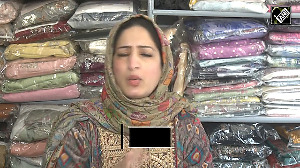Kalam, the first Asian to receive the honor that has been given annually since 1930 by the American Society of Mechanical Engineers was feted at the Columbia University, the venue for the award ceremony that was attended by students and faculty members of the university, including two Nobel Laureates, as well as top Indian diplomats and members of the Indian American community.
'I am delighted to receive the 2008 Hoover Medal. My greetings to the members of the Hoover Medal Board of Award and distinguished guests assembled here. I would like to thank the selection committee of the Hoover Medal Board for the honor bestowed upon me,' Kalam said.
'When I think of Hoover, I recall his belief in the 'Efficiency Movement' and that a technical solution existed for every social and economic problem. I consider it as a great honor to me for being awarded the Hoover Medal,' Kalam said in his acceptance speech after being handed the medal and a citation by Beatrice Hunt, chair of the Hoover Medal Board.
Over 200 members of the audience that included Vijay Nambiar, chief of staff of UN Secretary General Ban Ki-moon and Jagdish Bhagwati, Professor at Columbia, gave Kalam a standing ovation. Prabhu Dayal, Indian Consul General in New York, were seated on the dais along with Columbia professor P Somasundaran, vice chair, Hoover Medal Board and Gerald Navratil, interim dean, Fu Foundation School of Engineering and Applied Sciences, Columbia University.
"Kalam was chosen for this award out of eight nominees worldwide for his outstanding work for people of India. We wanted to show that engineers do not just necessarily sit in front of computers but their work often go beyond, and leave very beneficial impact on humanity," David Soukup, secretary Hoover Board, told rediff.com.
The Hoover Medal founded in 1929 was established to recognize 'great, unselfish, non- technical services by engineers to the humanity.
The organizers said Kalam, 'a pre-eminent scientist and gifted engineer and a true visionary' is being recognized for making state-of-the-art healthcare available to the common people in India at affordable prices, bringing quality medical care to rural areas by establishing a link between doctors and technocrats, using spin-offs of defense technology to create state-of-the-art medical equipment and launching telemedicine projects.
The projects connect remote rural-based hospitals to the super specialty hospitals in India.
Speakers like Thomas Abraham, chairman of the Global Organization of People of Indian Origin that helped organize the event along with ASME, described Kalam as a 'role model' for students and a 'modern day avtar'.
In his acceptance speech Kalam talked about how India is transforming a billion people to prosperity, one sixth of the world population. 'I thought if I talk on the transforming billion people to prosperity it may reflect the 1/6th of the world's population and derive similarities for the other part of many nations.What a phenomenal transformation that has taken place in the society during the 20th century, as we see now! Science and Technology have revolutionized our ways of life, transportation, communication, healthcare, education delivery, judiciary and in general human advancement. While nations are working to improve the lot of people and leap frog in development, there are forces at work to impede by way of extremism and terrorism. Society has to be dynamic to make progress and prepare itself for the challenges of the future" Kalam said.
Talking about the challenges of modern society, Kalam said advances in genetics demonstrating great similarity in the genome of man and animals shows that 'the limbic brain' perhaps is the cause for all conflicts within and outside. 'So far human society, from origin until now has always been at war within and between groups and has led to two World Wars. Presently, terrorism and low intensity warfare are affecting many parts of the world,' he said.
'Simultaneously the brain is intelligent to understand the price that humanity has paid because of such conflicts and if only this attention is diverted to development, the human civilization would have taken a shape leading to peaceful co-existence,' Kalam said.
'We have to analyze why wars have occurred so far in the human history and see, how do we avoid future conflicts. Paucity of resources, inequitable growth within countries and different parts of the world, deprivation, depleting resources, and ego are among the reasons for conflicts along with remnants of hatred from historical fights,' he said.
'So it becomes necessary to analyze potential sources of conflicts in the 21st century for us to spot problem zones and avoid conflicts, as far as possible. Man is fighting a war on all fronts --environmental degradation and diseases on one side and terrorism on the other side,' he noted.
How science and technology can find solution to these problems?
In his own words science, technology and humanities bring diverse groups across the world and challenge them to take up new avenues of research for finding a suitable solution in the evolving times of the world.
'The technology has expanded physical travel and connectivity to a large extent, beyond any realm of imagination in the past centuries. This kind of non linear growth of technology and its improvement of quality of human life across the world is in the best interest of the entire humanity,' Kalam said.







 © 2025
© 2025